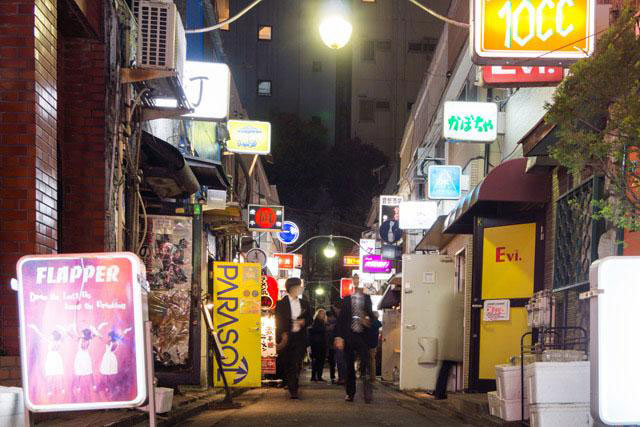
One of the best bits about traveling is meeting new friends, and that’s no different in Japan; however unless you have a little grasp on the language, it may be tricky. There are already countless phrasebooks, and apps to teach you survival Japanese but this piece isn’t about memorising the basics. Below is a list of small chat ammunition, little conversation starters you can give a go at next time you’re feeling confident and ready to make some new local friends.
-
01
Kyou wa ii tenki desu ne [今日はいい天気ですね]:
![Kyou wa ii tenki desu ne [今日はいい天気ですね]:]()
Kyou wa ii tenki desu ne [今日はいい天気ですね]:
Talking about the weather is the ultimate small-talk fallback topic across the globe, and in Japanese, this is how to say it. In English, this translates to ‘good weather today, isn’t it?’ Without diving too deep into a dry language lesson, some words from here worth saving to the memory bank are: Kyou - Day; tenki - weather; and ii- good.
-
02
Oshigoto wa nan desu ka [お仕事は何ですか?]:
![Oshigoto wa nan desu ka [お仕事は何ですか?]:]()
Oshigoto wa nan desu ka [お仕事は何ですか?]:
This means what is your job? A typical question asked when you meet someone for the first time in the west. It may not be as common in Japan, but it’s still a handy way to get to know about someone. If you’re at say, a bar and are feeling super casual, you can always try the abbreviated version ‘Oshigoto wa? [お仕事は?]’ but be sure the scene is right. Otherwise, it could seem a little too casual. The most critical piece of vocab to take from this is oshigoto which means work.
-
03
Dochira shusshin desu ka? [どちら 出身 です か?]:
![Dochira shusshin desu ka? [どちら 出身 です か?]:]()
Dochira shusshin desu ka? [どちら 出身 です か?]:
Want to sound a little more like a casual, familiar Japanese user? Then is it a more relaxed way to ask someone where they’re from. There are other textbook variations of this question, but give this one a go, and you’ll be chatting away in no time.
-
04
[Restaurant/ bar/ place etc] no osusume arimaska? [location の おすすめ ありますか?]:
![[Restaurant/ bar/ place etc] no osusume arimaska? [location の おすすめ ありますか?]:]()
[Restaurant/ bar/ place etc] no osusume arimaska? [location の おすすめ ありますか?]:
This is a good question to ask if you want to get to know what someone likes, but also to potentially pick up some local tips on the best places in the area. The term ‘no osusume arimaska’ basically works as ‘what do you recommend?’ So you could add, ‘restaurant’, ‘bar,’ ‘izakaya,’ ‘karaoke’ practically any location at the beginning and you’ll get the point across.
-
05
[Word] wa Nihongo de nan desu ka? [___は日本語で何ですか?]
![[Word] wa Nihongo de nan desu ka? [___は日本語で何ですか?]]()
[Word] wa Nihongo de nan desu ka? [___は日本語で何ですか?]
This sentence means ‘How do you say ___in Japanese?’ It's a fun way to pick up new vocab, or a handy one to have in the arsenal if you’re hanging with bilingual friends. If you’re just here for a short time or planning to study Japanese in the future, this question will get you far. It may also work as a good excuse to talk to someone.
-
06
Nihongo de hanashimashou [日本語で話しましょう!]
![Nihongo de hanashimashou [日本語で話しましょう!]]()
Nihongo de hanashimashou [日本語で話しましょう!]
So you’ve had a drink or two, you’re feeling increasingly confident about your Japanese skills, and you want to practice. You could always preface the conversation with this one, which means ‘let’s talk in Japanese!’. To remember, ‘hanashimashou’ translates in English to let’s speak! The Nihongo (read: Japanese) part can always be switched out for another language too.
-
07
Mou ichidou itte kudasai [もう一度言ってください ]
![Mou ichidou itte kudasai [もう一度言ってください ]]()
Mou ichidou itte kudasai [もう一度言ってください ]
Say you’ve been practising your Japanese phrases and you’re doing so well, your new Japanese buddy assumes you’re fluent, and rapid fire starts shooting sentences in Japanese at you, then this one may come in handy. It translates in English to ‘can you please say it again.’ It’s a rather polite wording, but if you're not too sure what’s going on, it’s always safest to be a little extra polite rather than too blunt.
Narita Airport - Karuizawa Bus by Goryo Bus
¥4,000
Update date:2024/04/25
![Kyou wa ii tenki desu ne [今日はいい天気ですね]:](https://article-image.travel.navitime.jp/img/NTJwide0042-en/7-Phrases-To-Help-You-Make-Friends-in-Japan-image-1.jpg)
![Oshigoto wa nan desu ka [お仕事は何ですか?]:](https://article-image.travel.navitime.jp/img/NTJwide0042-en/7-Phrases-To-Help-You-Make-Friends-in-Japan-image-2.jpg)
![Dochira shusshin desu ka? [どちら 出身 です か?]:](https://article-image.travel.navitime.jp/img/NTJwide0042-en/DSC00284.jpg)
![[Restaurant/ bar/ place etc] no osusume arimaska? [location の おすすめ ありますか?]:](https://article-image.travel.navitime.jp/img/NTJwide0042-en/7-Phrases-To-Help-You-Make-Friends-in-Japan-image-3.jpg)
![[Word] wa Nihongo de nan desu ka? [___は日本語で何ですか?]](https://article-image.travel.navitime.jp/img/NTJwide0042-en/DSC00023.jpg)
![Nihongo de hanashimashou [日本語で話しましょう!]](https://article-image.travel.navitime.jp/img/NTJwide0042-en/7-Phrases-To-Help-You-Make-Friends-in-Japan-image-4.jpg)
![Mou ichidou itte kudasai [もう一度言ってください ]](https://article-image.travel.navitime.jp/img/NTJwide0042-en/7-Phrases-To-Help-You-Make-Friends-in-Japan-image-5.jpg)

 Go here
Go here





